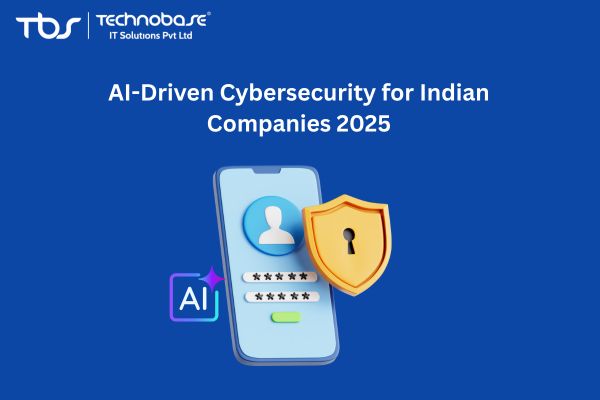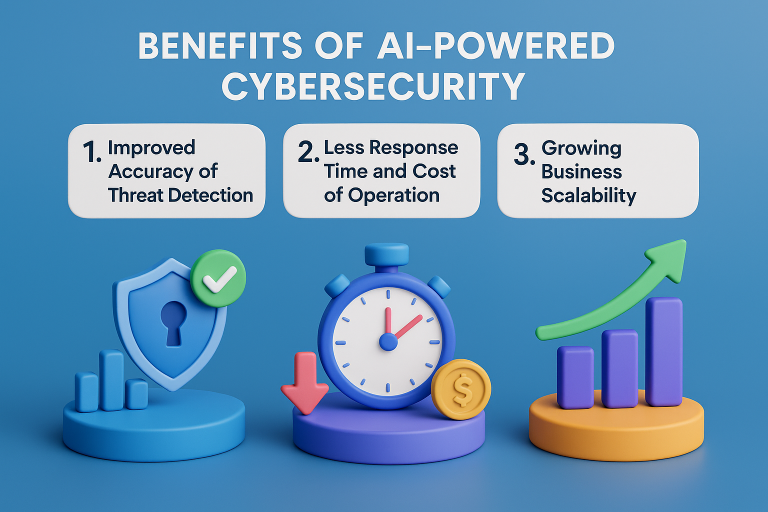AI-Driven Cybersecurity: What Indian Companies Must Know in 2025
As India continues to enhance its digital transformation journey, companies from all sectors have to report cybersecurity as a major concern. The question about the incorporation of Artificial Intelligence in cybersecurity solutions will no longer be a matter of "if" but "when," and it will not just be optional but mandatory in the year 2025.
Indian businesses are exposed to very advanced cyber threats such as ransomware, data leakage and others that make the adoption of AI-powered security solution systems imperative.

What is AI-Driven Cybersecurity?
The AI-based cybersecurity employs machine learning, deep learning and sophisticated algorithms to compute, prevent and react to cyber threats in real time. In contrast to the old security systems that are based on a set of rules, AI-based solutions use a learning approach and patterns to respond to new threats.
Machine Learning Threat Detection: AI systems examine large volumes of data to detect anomalies and possible breaches of security prior to their infliction of harm. These intelligent systems are able to handle millions of events in a second and be able to identify patterns that human analysts would otherwise not notice.
Automated Incident Response: AI-oriented systems can automatically isolate systems affected, block malicious traffic, and trigger remediation response protocols when threats are identified and make response faster in milliseconds rather than hours.
Predictive Analytics: With the help of past data and present trends, AI will formulate possible weaknesses and attack patterns and implement security proactively instead of reacting to attacks.
Why Indian Companies Need AI-Driven Cybersecurity Now
Digital transformation is the wave that has not only come with benefits but also necessitates the integration of APIs among businesses that prefer to remain competitive. That is why API integration became a part of contemporary business work.

Cyberattacks are on the increase in Indian businesses in an unparalleled surge. The complexity of these attacks has changed significantly, and threat actors are currently employing AI to overcome conventional security practices. Phishing, ransomware attacks, and advanced persistent threats (APTs) are becoming more focused and destructive.
Indian firms are now exposed to strict compliance standards with new laws such as the Digital Personal Data Protection Act (DPDPA) 2023. Organizational AI-assisted cybersecurity solutions assist organizations in:
Ensure compliance in a variety of regulatory frameworks.
-Automate the process of classification and protection of data according to the degree of sensitivity.
-Create elaborate audit trails to report to the regulators.
-Make sure there is real time breach detection and breach notification as mandated by the law.
India has a serious problem of skills shortage in cybersecurity and the country has thousands of vacant jobs. The use of AI-based solutions can occupy this gap by automating the tedious work of security personnel and enhancing the abilities of the available teams.
Benefits of AI-Powered Cybersecurity for Indian Enterprises
Improved Accuracy of Threat Detection.
Conventional signature-based security systems do not detect up to 30% of novel threats. The AI-based cybersecurity enhances the rate of detection by more than zero-day vulnerability and advanced attack patterns, along with behavioral analysis and anomaly detection.
Less Response Time and Cost of Operation.
Threat investigation is time-consuming as it may take hours or even days to carry it out manually. AI systems cut this down to minutes by automatically correlating events, ranking threats and recommending remediation. This effectiveness is applied in the form of savings of up to 40 percent in security operations.
Growing Businesss Scalability.
With the rise in online activities of Indian companies, AI-based security systems are easily scaled. Protecting cloud infrastructure, IoT devices, and remote workforces, etc., these systems scale to larger security perimeters without corresponding expansions in staff.
Insider Threats Protection.
AI is also good at detecting unusual user activity which may be used to signal compromised credentials or bad insiders. Through the introduction of behavioral patterns, AI systems are able to single out suspicious behaviors that are not within the norm.
The technology requirements of businesses change as the business expands. The integration of the API offers the ease of integration of new tools and services without necessarily replacing existing systems. This standardized method of technology infrastructure enables firms to expand operations without a hitch and embrace new solutions as they come along.
Implementing AI Cybersecurity: Best Practices for Indian Companies
Prior to the engagement of AI-driven solutions, a thorough security audit should be carried out to determine essential assets, vulnerabilities, and compliance needs in your specific industry.
Choose cybersecurity vendors who have achieved experience in AI and knowledge of the Indian regulatory environment. Find solutions which can provide:
-Integration with pre-existing security infrastructure.
-Industry specific threat customization.
-Local response and incident response capabilities.
-Open AI decision-making procedures.
Artificial intelligence adds value to yet does not eliminate human knowledge. Provide training to your security personnel to collaborate with AI systems, analyze AI-based discoveries, and make wise decisions concerning AI suggestions.
Use AI-driven zero-trust security models that authenticate all access requests, irrespective of their origin. This strategy is especially essential to organizations whose employees are remote and cloud-based.
Common Use Cases of API Integration
Cyberattacks do not care about the size of your company. Implementing strong security measures; firewalls, encryption, multi-factor authentication, and regular security audits will protect your enterprise as well as build trust with customers. Nowadays, many safe and thorough security solutions are available even at a budget-friendly subscription model.
Marketing teams utilize API integration to tie up advertising ecosystems, email marketing systems, social networks, and analytics consoles. Such connectivity facilitates end-to-end campaign tracking, automated lead nurturing, and data-driven marketing strategies that make the most of ROI.
Current customer care systems employ the use of API integration to retrieve customer information across various sources, which forms a 360-degree image of every customer. Purchase history, past interactions, and account details are available immediately to the support agents, allowing them to solve problems in a more efficient and quicker manner.
Future Trends: AI Cybersecurity in India
Quantum-Resistant Encryption
As quantum computing advances, AI will play a crucial role in developing and implementing quantum-resistant encryption algorithms to protect sensitive data.
AI-Powered Security for 5G Networks
With India's 5G rollout accelerating, AI-driven security solutions will be essential for protecting the expanded attack surface created by high-speed, low-latency networks.
Integration with Cloud Security
As more Indian businesses migrate to cloud platforms, AI-driven Cloud Security Posture Management (CSPM) tools will become standard for maintaining secure cloud environments.
Conclusion: Securing Your Digital Future
The 2025 cybersecurity environment requires smart, dynamic, and forward-thinking defense solutions. To Indian businesses, AI-powered cybersecurity is not a technology implementation matter, but a business continuity, regulatory and customer confidence issue.
The issue with cyber threats is not whether or not to use AI-powered security systems, but rather how soon you address it. The investing organizations currently working on AI-based cybersecurity will become the stable, reliable businesses of tomorrow.
